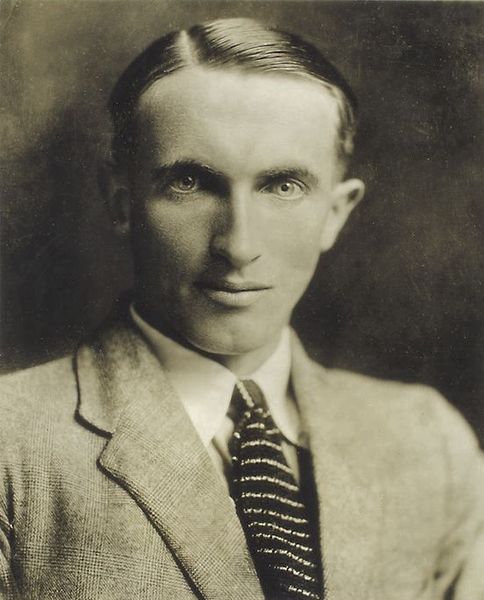<Back to Index>
- Writer Liam O'Flaherty, 1896
PAGE SPONSOR

Liam O'Flaherty (aka Liam Ó Flaithearta) was a significant Irish novelist and short story writer and a major figure in the Irish literary renaissance, born 28 August 1896, died 7 September 1984.
O'Flaherty was born in the remote village of Gort na gCapall, on Inishmore (one of the Aran Islands), county Galway. His family, descendants of the Ó Flaithbertaigh family of Connemara, were not well off. The Irish language was widely spoken in the area, and in the O'Flaherty household both English and Irish were used.
O'Flaherty was the son of Maidhc Ó Flaithearta and Maggie Ganley of Gort na gCapall. In 1908, at the age of twelve, he went to Rockwell College. This was followed by enrollments at Holy Cross and University College, Dublin. According to The Sunday Times, he also attended Belvedere College and Blackrock College. He did not attend the first two schools for long due to expulsion for possession of pornographic materials. He had intended joining the priesthood, but in 1917 he left school and joined the Irish Guards under the name 'Bill Ganly'. He served on the Western Front, where he was injured, and it is possible that the shell shock he suffered may have been responsible for the mental illness which became apparent in 1933.
He returned from the front as a socialist, having become interested in Marxism as a schoolboy, and two days after the establishment of the Irish Free State in 1922 O'Flaherty and a group of supporters seized a building in Dublin for four days, flying a red flag from it.
After the war O'Flaherty left Ireland and moved to the United States, where he lived in Hollywood for a short time. The well known director John Ford, a cousin, later turned Ó Flaithearta's novel, The Informer, into a film.
Many of his works have the common theme of nature and Ireland. He was a distinguished short story writer, and some his best work in that genre was in Irish. The collection Dúil, published towards the end of his life, contained Irish language versions of a number of stories published elsewhere in English. It is likely, for example, that the story 'The Pedlar's Revenge' was first written in Irish under the title 'Díoltas'. This collection, now widely admired, had a poor reception at the time, and this seems to have discouraged him from proceeding with an Irish language novel he had in hand.
In a letter written to The Sunday Times in later years he confessed to a certain ambivalence regarding his work in Irish, and spoke of other Irish writers who received little praise for their work in the language. This gave rise to some controversy.
In 1923, O'Flaherty published his first novel, Thy Neighbour's Wife, thought to be one of his best. In 1935, his novel The Informer (for which he had been awarded the 1925 James Tait Black Memorial Prize for fiction) was made into a film by John Ford. Over the next couple of years he published other novels and short stories. In 1933 he suffered from the first of two mental breakdowns.
He traveled in the United States and Europe, and the letters he wrote while traveling have now been published. He had a love of French and Russian culture, and this may have been part of the attraction he felt towards communism. Before his death, however, he left the Communist Party and returned to the Roman Catholic faith.
O'Flaherty died on 7 September 1984, in Dublin, and many of his works were subsequently republished. He is remembered today as a powerful writer and a strong voice in Irish culture. In 2006 a memorial garden was built in his native village of Gort na gCapall, with a plaque describing his life and writings. The garden sits on the road through the village near the path leading to the Wormhole.
Among his books are The Black Soul (1924), Thy Neighbour's Wife (1924), Funny The Way It Is (1925), The Informer (1925); adapted as a film (The Informer, 1935), Mr. Gilhooley (1926), If You Think About It (1926), The Wilderness (serialized 1927, gathered in book form and republished 1986), Return of the Brute (1929), A Tourist's Guide To Ireland (satirical, 1929), The Ecstasy Of Angus (1931), Skerrett (1932), his autobiography Shame The Devil (1934), Short Stories (1937; revised 1956), Famine (1937), Land (1946), Two Lovely Beasts and Other Stories (1950), Insurrection (1951), The Pedlar's Revenge and Other Stories (1976), and The Letters Of Liam O'Flaherty (published posthumously, 1996).
In addition to "The Sniper", some notable short stories by O'Flaherty are "Civil War", "The Shilling", "Going into Exile", and "A Red Petticoat".
In the 1970s he recorded a spoken word version of The Ecstasy Of Angus. This was released as a double album record in 1978 by Claddagh Records, Dublin.